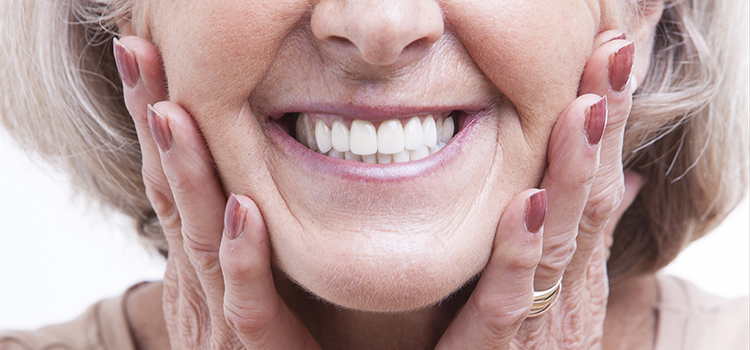Teeth Grinding In Seniors
1st Aug 2021

Bruxism doesn't have an age limit, so seniors are not exempt. The teeth grinding and jaw clenching can plague older people, leaving pain and tooth damage in their wake. While it might seem like this kind of behavior would be obvious, it can be surprisingly stealthy, especially if it happens when a person is sleeping or has a vulnerable condition. Fortunately, learning to spot teeth grinding in seniors can lead to effective treatments that can prevent pain and protect the senior's teeth and gums from further damage.
According to the Merck Manuals, "Tooth enamel tends to wear away with aging, making the teeth vulnerable to damage and decay. Tooth loss is the major reason that older people cannot chew as well and thus may not consume enough nutrients". That makes identifying and treating teeth grinding in a senior vital for both their oral and overall health. To do the job effectively, you'll need to know how to recognize bruxism in seniors and identify what causes them to brux. In addition, you'll want to explore some treatment options.

Recognizing Bruxism in Seniors
Because bruxism is an unconscious behavior, seniors are often unaware they're suffering from the problem until significant damage has been done to their teeth and gums. Having a caregiver or loved one notice the red flags provides an opportunity to seek treatment sooner and potentially prevent painful side effects.
As MedicineNet reports, the signs and symptoms of teeth grinding in seniors include:
- Tooth wear and sensitivity
- Fractured, loose, or broken teeth
- Tooth loss
- Jaw pain
- Facial pain
- Achy, sore jaw muscles
- Gum damage
- Headaches
- Earaches
- Fatigue
- Squeaking, grating, crunching, or scraping sounds
Common Causes of Teeth Grinding
Some of the common causes of bruxism are triggers for all ages. As Mayo Clinic points out, these factors can increase the risk of teeth grinding:
- Stress: Anxiety, anger, and frustration can trigger both daytime and sleep bruxism. Most research concludes that stress is one of the most common factors across bruxers and bruxism and stress are related.
- Sleep-related Disorders: Patients with sleep apnea or other sleep disorders are more likely to brux. Having a family member who grinds their teeth also increases the risk.
- Temporomandibular Joint Disorder: TMJ disorder and bruxism often seem to occur together. TMJ (or TMD) is characterized by dysfunction of the jaw joint and results in many of the same painful symptoms as bruxism. Severe cases of bruxism that go untreated can cause tooth damage that triggers a TMJ disorder. However, teeth grinding can also be a symptom of a TMJ disorder.
- Gastroesophageal Reflux Disease: A 2018 study in the Journal of Clinical Medicine confirms that there are "strong associations" between GERD, bruxism, and tooth wear.
- Antidepressants And Other Medications: Antidepressants and some psychiatric medications can also cause teeth grinding and clenching. Using tobacco, caffeine, alcohol, or recreational drugs (especially before bed) can also boost your risk of bruxism. If you think a medication is causing your bruxing, speak with your doctor about changing your medications.

Related Articles:
Causes of Bruxism in Seniors
The above-mentioned bruxism triggers are risk factors for any age. However, there are causes of bruxism that are prevalent among seniors, specifically.
- Parkinson's Disease: Parkinson's disease can impact dental health in many ways due to physical and behavioral habits. The Parkinson’s Foundation explains, “People with PD who have been on medications like levodopa for several years may begin to develop dyskinesias (involuntary movements), which can affect the jaw… and cause cracked teeth and teeth grinding”. Parkinson’s can also lead to depression and other dental health problems.
- Alzheimer’s Disease: Alzheimer’s and Dementia can cause unconscious grinding. This is difficult to treat because the patient may be unaware that they clench/grind or will be unable to communicate the painful symptoms they experience. Some medications that are commonly prescribed for these illnesses can also influence teeth grinding. Additionally, the memory loss associated with Alzheimer’s can impact dental and sleep hygiene.
- Stroke: It is not uncommon for people to begin teeth grinding after a stroke or other brain injuries. Researchers are unsure as to why brain damage puts seniors at higher risk for bruxism.
It is imperative that caregivers and loved ones monitor seniors if they fall into any of these categories to ensure that they do not develop bruxism. If you find that a senior is grinding their teeth, there are treatment options readily available.

- Most Popular
- Hard Outside, Soft Inside
- 2MM Thick
- Moderate / Heavy

- Most Durable
- Hard Materials
- 1.5MM Thick
- Heavy / Severe

- For Day Time Use
- Thin, Barely Visible
- 1MM Thick
- Light / Moderate

- For Clenching
- Flexible & Soft
- 1.5MM Thick
- Light / Moderate
Treating Teeth Grinding in Seniors
When it comes to treating bruxism, mouthguards are generally the first strategy on the recommendation list. Also called oral splints or night guards, these appliances are worn on the upper or lower teeth to prevent clenching and limit the damage from grinding. As HealthStatus indicates, custom-fit options sold by online retailers offer better comfort and durability at an affordable price. However, some seniors may refuse to wear mouthguards.
Botox injections are another popular approach. Botox for teeth grinding involves injecting this paralytic drug into the masseter muscle, which is the large muscle responsible for moving the jaw. The idea is to relax the muscle so that it won't clench without interfering with the patient's ability to chew, eat, or talk. Treatment should last three to six months before the patient needs another dose.
Other treatment options include taking steps to treat or manage the underlying medical condition that's triggering the bruxism. In addition, seniors should take steps to manage their stress. Practicing good sleep habits, stress management, and conducting relaxation techniques can also help.
Related Articles:
- Is Botox For Teeth Grinding Covered By Insurance
- Snoring And Teeth Grinding
- Biofeedback Headband For Bruxism
Teeth Grinding in Seniors
If you notice any of the common side effects of bruxism or teeth grinding seniors, there are many different treatment options to explore. As with bruxism in any age, identifying the underlying cause of the bruxism is the best way to treat teeth grinding. If bruxism is the problem, and you decide that a mouthguard could be the solution, be sure to visit Pro Teeth Guard. We offer custom-fit mouthguards at affordable prices. Our night guards are created in a professional dental lab, and every night guard is guaranteed to fit comfortably with our 110% money-back guarantee.
References:
- Sulyanto, R. (2020). Effects of Aging on the Mouth and Teeth - Mouth and Dental Disorders. Merck Manual. https://www.merckmanuals.com/home/mouth-and-dental-disorders/biology-of-the-mouth-and-teeth/effects-of-aging-on-the-mouth-and-teeth
- Conrad Stoppler, M. (2019). Bruxism (Teeth Grinding): Symptoms, Signs, Causes & Treatment. MedicineNet. https://www.medicinenet.com/bruxism_teeth_grinding_symptoms_and_signs/symptoms.htm
- Mayo Clinic Staff. (2017). Bruxism (teeth grinding). Mayo Clinic. https://www.mayoclinic.org/diseases-conditions/bruxism/symptoms-causes/syc-20356095
- Li, Y., Yu, F., Niu, L., Hu, W., Long, Y., Tay, F. R., & Chen, J. (2018). Associations among Bruxism, Gastroesophageal Reflux Disease, and Tooth Wear. Journal of clinical medicine, 7(11), 417. https://doi.org/10.3390/jcm7110417
- Kwak, Y. T., Han, I. W., Lee, P. H., Yoon, J. K., & Suk, S. H. (2009). Associated conditions and clinical significance of awake bruxism. Geriatrics & gerontology international, 9(4), 382–390. https://doi.org/10.1111/j.1447-0594.2009.00538.x
- HealthStatus Crew. (2020). How to Manage Teeth Grinding (Bruxism) in Dementia? HealthStatus. https://www.healthstatus.com/health_blog/wellness/how-to-manage-teeth-grinding-bruxism-in-dementia/
- Parkinson's Foundation Writing Staff. (n.d.). Dental Health in Parkinson's. Parkinson's Foundation. https://www.parkinson.org/pd-library/fact-sheets/Dental-Health-in-Parkinsons

- Most Popular
- Hard Outside, Soft Inside
- 2MM Thick
- Moderate / Heavy

- Most Durable
- Hard Materials
- 1.5MM Thick
- Heavy / Severe

- For Day Time Use
- Thin, Barely Visible
- 1MM Thick
- Light / Moderate

- For Clenching
- Flexible & Soft
- 1.5MM Thick
- Light / Moderate

